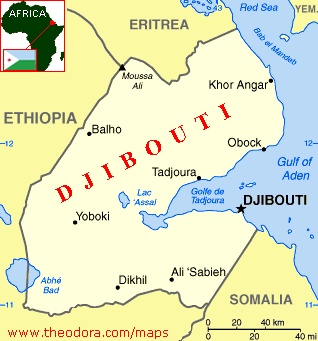Djibouti evicts US vote group ahead of election
Djibouti’s government has kicked out an American election monitoring group less than a month before the nation’s presidential election, a vote opposition politicians are boycotting because they say the president is repressing dissent.
 Djibouti is a tiny East African nation that hosts the only U.S. military base in Africa. Situated on the Gulf of Aden between Somalia, Ethiopia, Eritrea and Yemen, the city-state is a major shipping hub in a volatile region.
Djibouti is a tiny East African nation that hosts the only U.S. military base in Africa. Situated on the Gulf of Aden between Somalia, Ethiopia, Eritrea and Yemen, the city-state is a major shipping hub in a volatile region.
The country is nominally democratic, but events leading up to the April 8 presidential election appear to show a hardline approach by President Ismail Omar Guelleh at a time when democracy movements are upending administrations.
Democracy International, a U.S. group that works on democracy and governance programs, was halfway through a two-year, $2.2 million U.S. government-funded contract when it was accused of assisting opposition politicians and barred from the country earlier this month.
The head of the group’s observation mission, Chris Hennemeyer, said the accusations are not true.
Djibouti saw an estimated 6,000 people tu
rn out to an opposition political rally on Feb. 18. The rally turned violent when riot police moved in, and opposition politicians said dozens of people were wounded and five killed. A second rally planned for March 4 didn’t happen after security forces filled the streets.
Hennemeyer said many countries in the region are nervous during a time of popular protests, and that the February rally surprised Djiboutian leaders.
“They were not expecting such a large turnout, and I think those two factors – regional nervousness and the protest – were enough to lead at least some people in the government to conclude that this was not the kind of program that they wanted to support,” Hennemeyer said of the reasons Democracy International was kicked out.

Turkey's Foreign Minister Ahmet Davutoglu poses with Somalia's President Sheikh Sharif Sheikh Ahmed (L) and U.N. Secretary-General Ban Ki-moon (R) during the Istanbul Conference on Somalia in Istanbul May 22, 2010. Ban is in Turkey to attend an international conference on Somalia, co-hosted by the United Nations and the Turkish government. The Istanbul meeting is aimed at advancing the Djibouti peace process and will also focus on ways to combat piracy off the Somali coast, the U.N. said. REUTERS/Murad Sezer Turkey's Foreign Minister Ahmet Davutoglu poses with Somalia's President Sheikh Sharif Sheikh Ahmed (L) and U.N. Secretary-General Ban Ki-moon (R) during the Istanbul Conference on Somalia in Istanbul May 22, 2010. Ban is in Turkey to attend an international conference on Somalia, co-hosted by the United Nations and the Turkish government. The Istanbul meeting is aimed at advancing the Djibouti peace process and will also focus on ways to combat piracy off the Somali coast, the U.N. said. REUTERS/Murad Sezer
Calls to Foreign Minister Mahmoud Ali Youssouf were not answered, and the government spokesman said he couldn’t immediately talk. But Youssouf told the Financial Times this week that Democracy International exhibited “concerning” behavior and that the U.S. could nominate another observer group. He said the EU, African Union and Arab League have been invited to send observers to the vote.
The U.S. has outsized influence in Djibouti, a country of only 750,000 people. On the outskirts of Djibouti city, across from its international airport, lies Camp Lemonnier, the only U.S. base in Africa. The base -which sits just miles (kilometers) from Somalia – is one of Djibouti’s major employers.
The U.S. ambassador met with Djibouti’s prime minister over the Democracy International expulsion, but the group was kicked out anyway, Hennemeyer said. A U.S. Embassy spokesman said the embassy was not prepared to comment.
Guelleh, the president, has served two terms already. His critics lament changes he made to the constitution last year that scrubbed a two-term limit from the nation’s bylaws. Guelleh will face one opponent on April 8, one not expected to win many votes.
Last Friday Djibouti authorities arrested four opposition politicians and detained them several hours, according to the opposition leaders. The group said it “can no longer tolerate the repressive and deadly fury of this moribund regime.
“We warn the illegal candidate against his irresponsible actions at the risk of seeing radicalization of our actions, which have up to now been peaceful,” the group said, referring to Guelleh. “The opposition can no longer continue to respect the law when the ruling power itself tramples on it.”
Hennemeyer said he believes Djibouti – which has been controlled by the same family since independence in 1977 – is moving toward democracy, including having allowed past demonstrations and carrying opposition messages in state media.
“There were signs of progress in important areas,” he said. “What will happen to those now I honestly don’t know. I don’t see Djibouti moving backward, but I’m not sure I see it moving forward in a democratic sense either.”

![[Most Recent Quotes from www.kitco.com]](https://i0.wp.com/www.kitconet.com/charts/metals/gold/t24_au_en_usoz_2.gif)
![[Most Recent Quotes from www.kitco.com]](https://i0.wp.com/www.kitconet.com/charts/metals/silver/t24_ag_en_usoz_2.gif)

You must be logged in to post a comment.